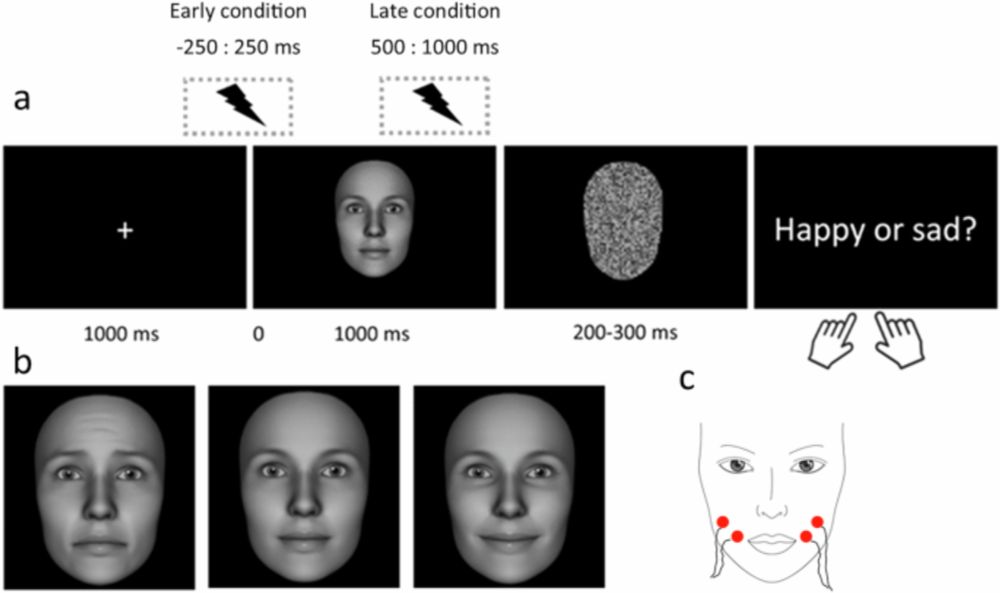Sometimes I think about how from 1935-1975ish, Bell Labs produced an insane amount of revolutionary science and technology, including 11 Nobel Prizes, the transistor, UNIX, C, the laser, the solar cell, information theory, etc. The secret? Provide scientists with ample, steady, no-strings funding.
04.10.2025 17:35 — 👍 1743 🔁 493 💬 51 📌 35

Meme showing a worker labelled "academic staff" digging a hole in the ground while 10 others look labelled with management titles such as "Director of Human Resources" look on. The caption underneath reads "The only way we can cut costs is to reduce the number of academic staff..."
A meme for the modern university...
29.09.2025 20:44 — 👍 289 🔁 110 💬 8 📌 9
Our #sEEG study is now published in Nature Communications: rdcu.be/eIkoG! 🧠
Key finding: We discovered neural evidence accumulation for visual perception that's independent of report preparation—recorded from >3000 channels across 3 experiments!
#Neuroscience #Consciousness #OpenAccess
29.09.2025 15:27 — 👍 33 🔁 13 💬 0 📌 2


New in @pnas.org: doi.org/10.1073/pnas...
We study how humans explore a 61-state environment with a stochastic region that mimics a “noisy-TV.”
Results: Participants keep exploring the stochastic part even when it’s unhelpful, and novelty-seeking best explains this behavior.
#cogsci #neuroskyence
28.09.2025 11:07 — 👍 92 🔁 35 💬 0 📌 3
OSF
detection d' is generally overestimated, coz we tend to be too lazy to collect the necessary data in order to correct for the unequal variance between target present vs absent distributions. turns out we can do this for free - using reaction times data. so, let's do it~
osf.io/preprints/ps...
🧠📈
25.09.2025 03:04 — 👍 32 🔁 9 💬 0 📌 2
Common neural choice signals reflect accumulated evidence, not confidence! Now out in @cerebralcortex.bsky.social w @helenevanmarcke.bsky.social @pierreledenmat.bsky.social @yfvisser.bsky.social @denizerdil.bsky.social a.o.
Paper: desenderlab.com/wp-content/u... Thread ↓↓↓
19.09.2025 10:47 — 👍 44 🔁 21 💬 1 📌 0

Transitions in dynamical regime and neural mode during perceptual decisions - Nature
Simultaneous recordings were made of hundreds of neurons in the rat frontal cortex and striatum, showing that decision commitment involves a rapid, coordinated transition in dynamical regime and neura...
How does the brain decide? 🧠
Our new @nature.com paper shows that neural activity switches from an 'evidence gathering' to a 'commitment' state at a precise moment we call nTc.
After nTc, new evidence is ignored, revealing a neural marker for the instant when the mind is made up.
rdcu.be/eGUrv
17.09.2025 20:12 — 👍 245 🔁 96 💬 14 📌 2
OSF
Our new EEG + modeling work using the beads task is now preprinted osf.io/preprints/ps..., led by Christina Dimitriadou @rhulpsychology.bsky.social
15.09.2025 11:26 — 👍 0 🔁 1 💬 0 📌 0


Interested in #EEG #FPVS #FaceLearning?
*An Ecological and Objective Neural Marker of Implicit Learning of Unfamiliar Identities*
Preprint 👉 osf.io/preprints/ps...
@bfh-ch.bsky.social University of Malta @snsf.ch
04.09.2025 06:03 — 👍 3 🔁 4 💬 0 📌 0
🚨We believe this is a major step forward in how we study hippocampus function in healthy humans.
Using novel behavioral tasks, fMRI, RL & RNN modeling, and transcranial ultrasound stimulation (TUS), we demonstrate the causal role of hippocampus in relational structure learning.
28.08.2025 14:00 — 👍 127 🔁 47 💬 2 📌 6
statistician: But aren't you assuming normality?
28.08.2025 15:24 — 👍 3 🔁 0 💬 0 📌 0
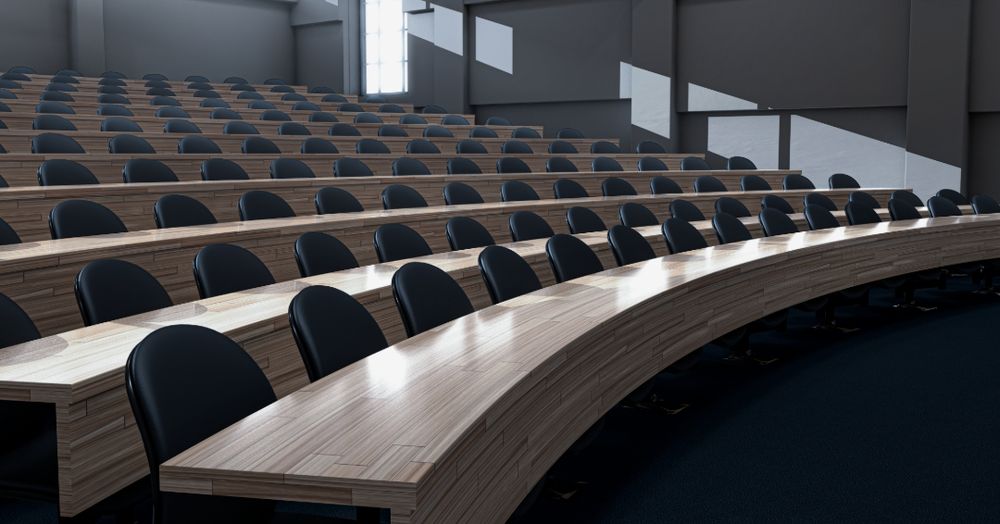
A world without experts: alienation in academia
Thoughts on the level of alienation in academic work, and how as much as we cannot exit the economy, we must recognise the inherent value of academia.
This is good on the extraordinary alienation that has now grown up in academia. The gap between the values of lecturers and the universities that employ them are now a huge unbridgeable chasm. One stands for education, the other institutional self-interest. blog.matthewbarnard.phd/a-world-with...
27.08.2025 18:20 — 👍 49 🔁 18 💬 1 📌 3

Windows Notepad, the native simple text editor, now has formatting options and a Copilot button.
Look what they did to Notepad. Shut the fuck up. This is Notepad. You are not welcome here. Oh yeah "Let me use Copilot for Notepad". "I'm going to sign into my account for Notepad". What the fuck are you talking about. It's Notepad.
27.08.2025 01:41 — 👍 17529 🔁 4600 💬 453 📌 498
It's a pity we have to write conclusions for papers and can't just fade them out, like musicians do.
26.08.2025 12:55 — 👍 8 🔁 3 💬 0 📌 0
really fun to be reading critiques of "AI" from the 90s, 80s, 70s, and 60s that perfectly identify all the core questions the field still hasn't resolved and anticipate exactly where we're at now
26.08.2025 07:22 — 👍 19 🔁 2 💬 1 📌 0
In UK UG ed, students take exactly one subject chosen when 18 yo. One more reason that's not ideal. As a USA undergrad I had to evidence foreign language learning to get my psychology degree. I used my high school French classes but otherwise students in Illinois needed to take a foreign language.
25.08.2025 05:40 — 👍 1 🔁 0 💬 1 📌 0
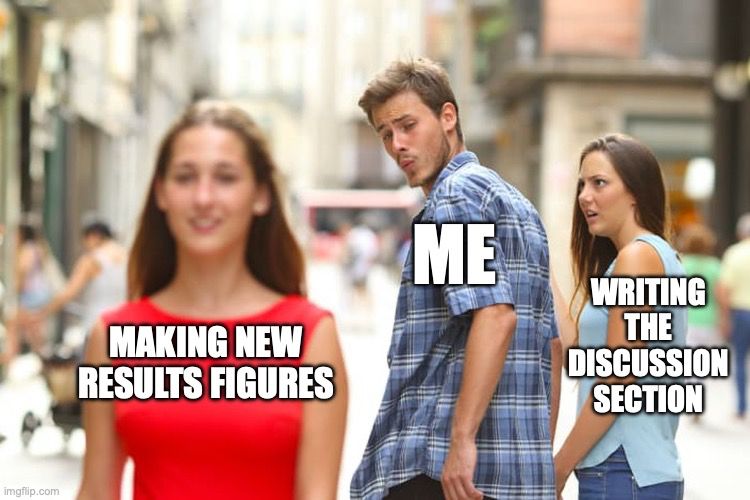
Distracted Boyfriend meme: ME looking away from WRITING THE DISCUSSION SECTION to ogle MAKING NEW RESULTS FIGURES
I'm going to finish this manuscript by the end of the week, I told myself
07.08.2025 17:02 — 👍 142 🔁 18 💬 0 📌 3
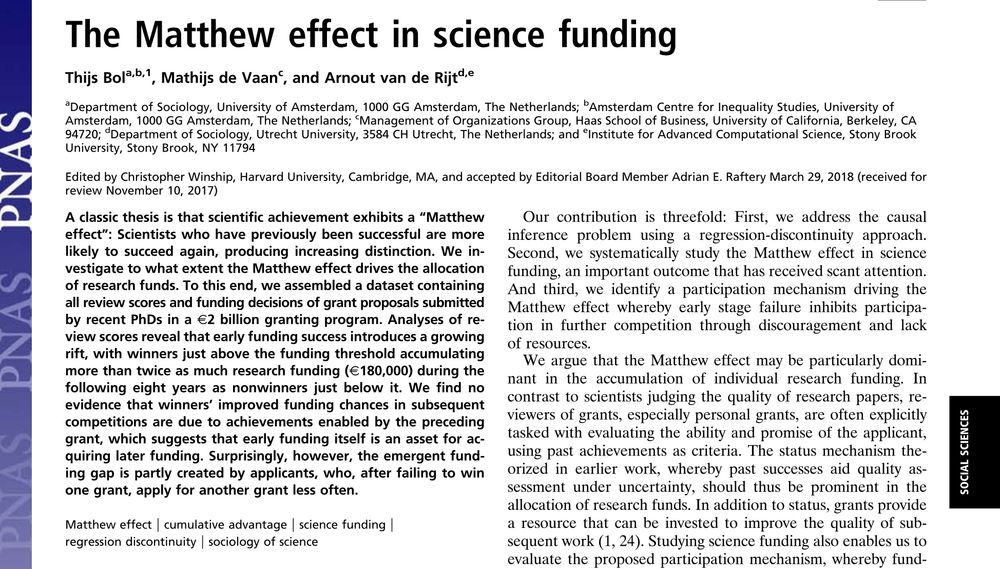
Academia is basically a collection of people who got lucky early on and mistook it for genius. doi.org/10.1073/pnas...
04.08.2025 11:26 — 👍 434 🔁 134 💬 13 📌 19
Our new paper is out! When navigating through an environment, how do we combine our general sense of direction with known landmark states? To explore this, @denislan.bsky.social used a task that allowed subjects (or neural networks) to choose either their next action or next state at each step.
02.08.2025 08:37 — 👍 70 🔁 25 💬 0 📌 0
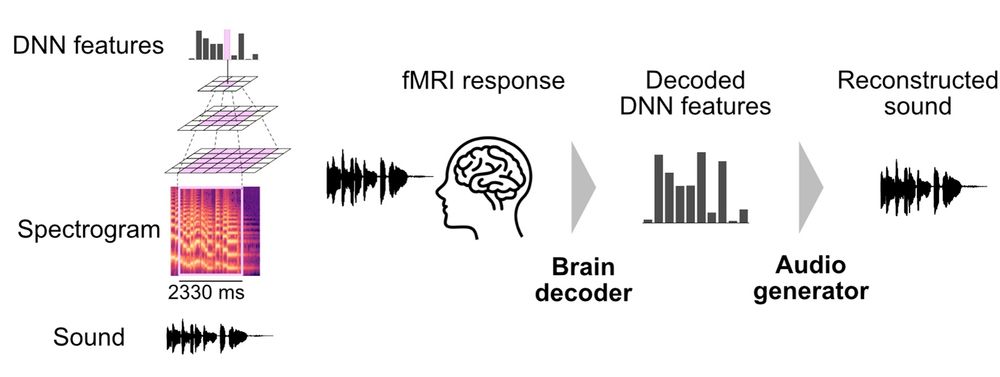
Schematic overview of the proposed sound reconstruction pipeline. Left: DNN feature extraction from sound. A deep neural network (DNN) extracts auditory features at multiple levels of complexity using a hierarchical framework. Right: Sound reconstruction. The reconstruction pipeline starts with decoding DNN features from fMRI responses using trained brain decoders. The audio generator then transforms these decoded features into the reconstructed sound.
Reconstructing sounds from #fMRI data is limited by its temporal resolution. @ykamit.bsky.social &co develop a DNN-based method that aids reconstruction of perceptually accurate sound from fMRI data, offering insights into internal #auditory representations @plosbiology.org 🧪 plos.io/4fhNw1Z
25.07.2025 14:07 — 👍 16 🔁 6 💬 0 📌 0
Thing I am an absolute complete total reactionary about: there has not actually been invented a better model of conveying information in a learning environment than the basic structure of a traditional lecture. A speaker standing in some sort of unique focal point for the attention of listeners...
12.07.2025 11:46 — 👍 877 🔁 96 💬 61 📌 49
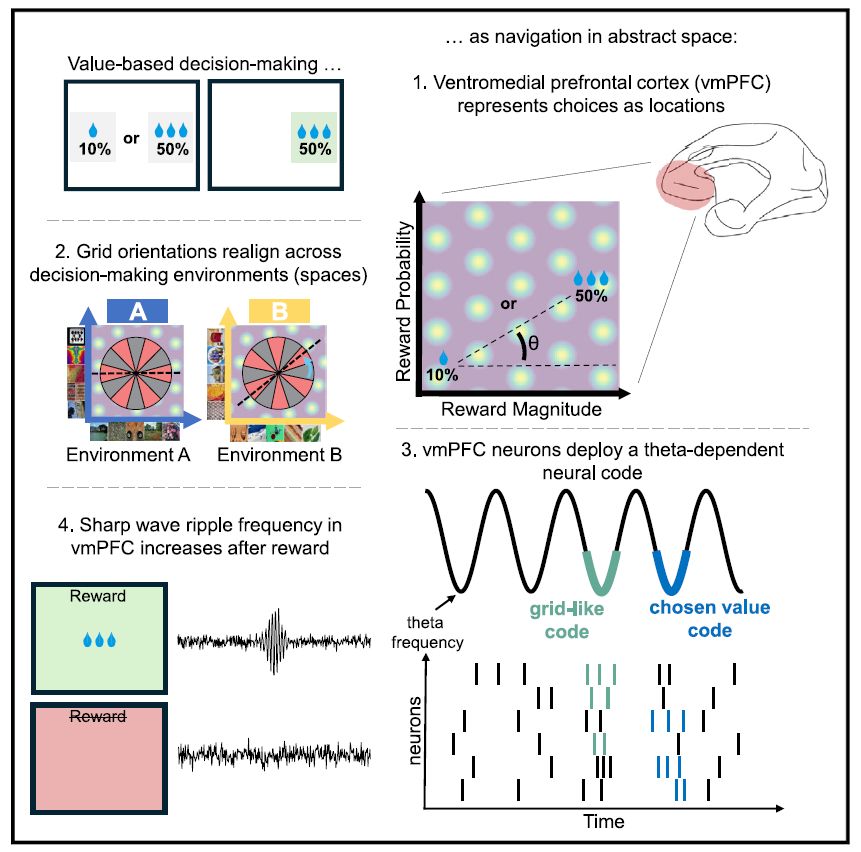
Navigating the value space during choice
Rhesus macaques represent choices as navigation trajectories in a value space using a grid-like code
www.cell.com/cell/fulltex...
11.07.2025 09:52 — 👍 6 🔁 5 💬 0 📌 1
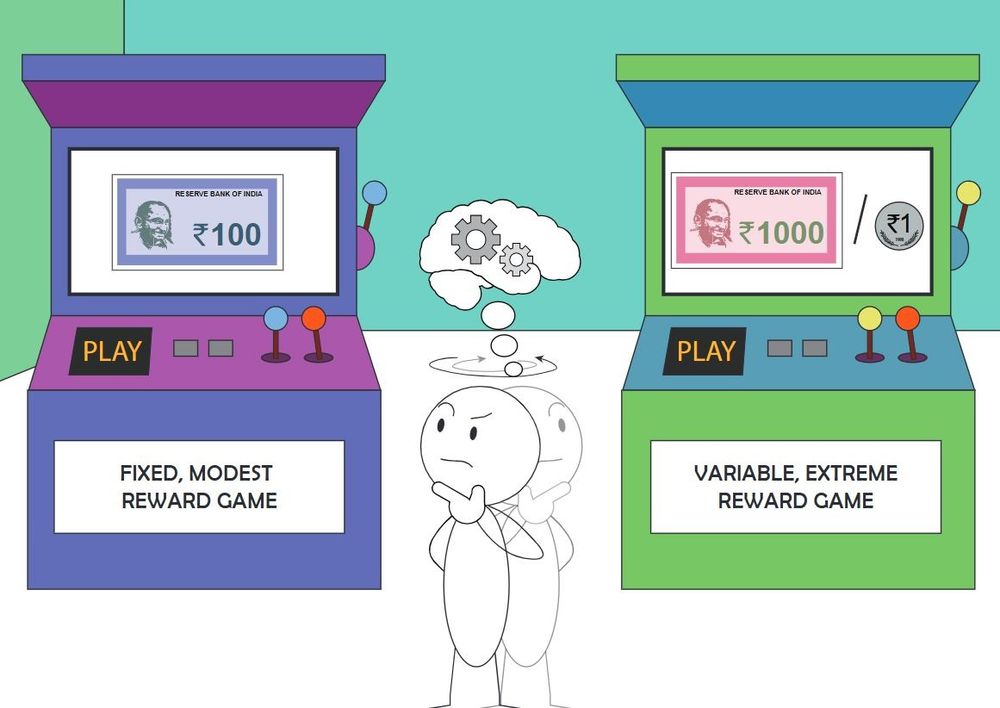
At the crossroads of risk and certainty: an individual deliberates between a safe game of ₹100 versus a risky game of ₹1 to ₹1000. How does the brain process such reward expectations and drive this individual's attention and choice? The image shows cartoon with a confused person standing in front of two fruit machines, one labelled “Fixed, modest reward game” and one “Variable, extreme reward game.” Image credit: Ankita Sengupta.
Reward expectation modulates #attention & #DecisionMaking but are these mediated by common or distinct mechanisms? This study shows that spatial manipulation of #reward expectation modulates sensitivity, while choice-based manipulation affects decision making @plosbiology.org 🧪 plos.io/4eDPERq
09.07.2025 08:32 — 👍 8 🔁 1 💬 0 📌 1
LOL. I've definitely seen lots of (3)!
30.06.2025 11:21 — 👍 1 🔁 0 💬 0 📌 0
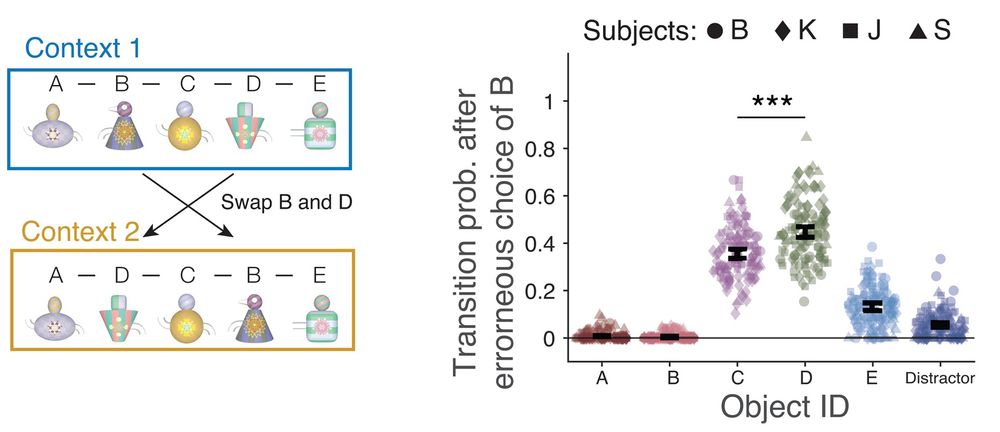
Subjects swap objects between non-adjacent ordinal positions. Left: Context 2 swapped the ordinal position of objects B and D. Right: Probability of choosing objects immediately after erroneously choosing object B in context 2: Three stars denote p < 0.001 difference (Welch’s t test with Bonferroni correction).
How smart are #NonHumanPrimates? This study shows that #macaques can learn to rearrange members of 5-object sequences to non-adjacent positions, suggesting that they form non-spatial cognitive maps of item relationships during learning, a hallmark of #intelligence @plosbiology.org 🧪 plos.io/40fZIKi
24.06.2025 13:13 — 👍 4 🔁 2 💬 0 📌 0
We are a world-leading centre for neurological research within the UCL Faculty of Brain Sciences. www.ucl.ac.uk/brain-sciences/ion
Max Planck UCL Centre for Computational Psychiatry and Ageing
Psychology prof at Durham + interdisciplinary stuff (usually psychosis, inner speech, a bit of neurodiversity). Author of "Presence: The Strange Science of the Unseen Other" (MUP).
Chair of @theichr.bsky.social
Psychology with teeth: unpacking everything from gaming quirks and cultural absurdities to authoritarian power plays and the psychology of resistance.
🎓 Empowering students with psychology tools.
🌍 Empowering people with psychological insights.
Slowly becoming a neuroscientist.
EiC @elife.bsky.social
interested in how we learn and later use knowledge in decisions, and how those processes can go awry in psychiatric disorders. LMDlab @UCL, MRC fellow.
I study the neural basis of social intelligence and face perception in humans and other animals.
Director of the BrisBRAIN Lab at the University of Queensland in BrisBANE Australia.
Behavioral neurologist and vision scientist at the University of Pennsylvania
https://www.gkaguirre.com/
Cognitive neuroscientist at UPenn. Interested in scenes, memory, space. Occasionally thinks about other things.
computational cognitive science @ nyu. director NYU minds, brains, and machines initiative. https://gureckislab.org. Are you interested in research in my lab? https://intake.gureckislab.org/interest/
The Consensus Project bridges research and practice to help teams, organizations, and networks—across sectors—navigate the complexity of collaboration.
Official account of Saturday Morning Breakfast Cereal created by
@zachweinersmith.bsky.social.
Home of the ongoing webcomic SMBC, A City on Mars, and of little books featuring large concepts abridged beyond the point of usefulness.
Yukiyasu Kamitani | 神谷之康 Neuroscientist and brain decoder
http://kamitani-lab.ist.i.kyoto-u.ac.jp
http://youtube.com/@ATRDNI/videos
https://twitter.com/ykamit
Rare Book & Manuscript Library at University of Illinois Urbana-Champaign | Main Library 346 | https://www.library.illinois.edu/rbx/
Follow us on Instagram (illinois_rbml) and Facebook (IllinoisRBML)!
Researcher and psychiatrist in Oxford
Research on computational cognitive models, the role of contexts, decision-making, Bayesian brain theories, and neuroimaging. Chair of Cognitive Computational Neuroscience @TU Dresden. More info on: https://tu-dresden.de/mn/psychologie/ifap/ccns
"The program that questions everything... except your intelligence."
Sundays at 11 am on KALW 91.7 FM in the San Francisco Bay Area.
Worldwide at philosophytalk.org
#PhilSky #Philosophy
friendly neighbourhood Schopenhauerian
• part time Proustian • associate professor @philoswarwick.bsky.social • author @uchicagopress.bsky.social
Science in the Service of Animal Welfare
UFAW is an international, independent scientific and educational animal welfare charity and membership society.
Visit our website: ufaw.org.uk
Become a member: ufaw.org.uk/join
Donate: ufaw.org.uk/donatescience

















